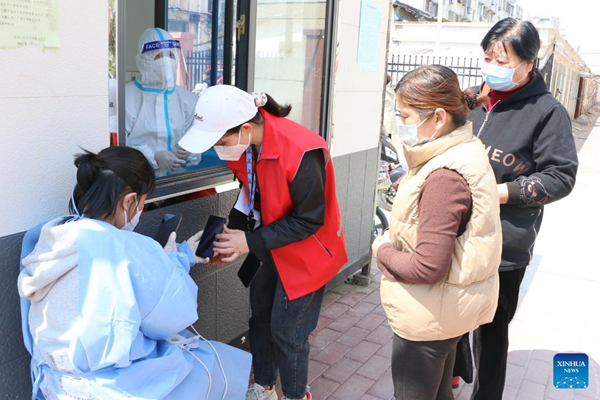China Focus: China Expands Public Welfare Jobs for Vulnerable Groups in Push for Common Prosperity
 |
| Photo taken on April 19, 2022 shows Wang Junru (1st L) helping people register information at a nucleic acid testing site in Linqing, east China's Shandong Province. [Xinhua] |
JINAN, May 11 (Xinhua) — After four years of living without a stable income, 43-year-old Wang Junru from east China's Shandong Province now works at a local nucleic acid test site.
"Please use your mobile phone to scan the QR code and fill in your information," Wang, dressed in a white hazmat suit, kept telling people queued up at a test site in Linqing City.
Wang got the job after submitting an application to a local public welfare employment program in March. Now she makes around 2,000 yuan (about 297 U.S. dollars) per month, which is enough to cover her basic living expenses.
Created and funded by the government, public welfare jobs refer to management and service positions that serve public interests. The policy, which has been implemented in China for decades, has effectively assisted long-term unemployed people to find jobs and helped absorb rural surplus labor and improve the livelihood of the country's low-income population.
In 2020, China's Ministry of Human Resources and Social Security and six other departments jointly issued a notice on making better use of public welfare jobs to enhance employment security. Last month, the ministry once again noted the policy at a press conference, saying that more public welfare jobs will be created as part of the efforts to improve the employment situation of vulnerable groups.
In Linqing, a city with around 800,000 residents, over 3,000 people have benefited from public welfare employment this year, most of them from low-income rural households or the so-called "zero-employment families," whose members are all jobless.
The policy also helps those who face the risk of falling into extreme poverty due to illnesses or disabilities. Ma Xiuzhong, a 31-year-old resident in Zhaoguanying East Village of Linqing, suffers from uremia and is incapable of any heavy labor. Thanks to the public welfare jobs program, he got a "river conservator" job in March, mainly responsible for patrolling the river in his village and cleaning up floating garbages from the water.
"This job requires no heavy labor and fits me well," said Ma, adding that the job means a lot to him and his family — economically in particular.
Some public welfare jobs have emerged as a result of new, urgent needs of the society, such as Wang's job at the nucleic acid test site amid the COVID-19 outbreak.
Elsewhere in Shandong, the city of Linyi, which has a forest coverage rate of over 23 percent, has enrolled nearly 3,000 people for forest patrol and fire prevention, while Yicheng District of Zaozhuang City has offered seven types of public welfare jobs related to ecological protection, such as afforesting mountains and restoring wetlands.
To date, Shandong has created a total of 409,700 such jobs, 80 percent of which are based in rural areas where employment opportunities are scarcer and public services are often in short supply.
"Public welfare posts attract more people to participate in rural community-level governance, and to engage in major public affairs such as epidemic prevention and protection of farming infrastructure," said Yi Junqiang, director of the Shandong provincial public employment and talent service center.
In December 2021, Shandong put forth a new plan to create about 1.2 million public welfare jobs between 2021 and 2025, mainly for vulnerable social groups and the older people.
"China's active promotion of public welfare jobs will not only help offset the negative impact of COVID-19 on employment, but also give hope to more low-income and low-skilled people in their pursuit of a better life," said Sun Tao, a professor in economics at Shandong University.
As China has set the ambitious goal of achieving "common prosperity" for its 1.4 billion people, Sun said, in the future government expenditures on public services and transfer payments to primary-level governments are expected to further increase, so as to improve both the quantity and quality of public welfare jobs.
(Source: Xinhua)
Please understand that womenofchina.cn,a non-profit, information-communication website, cannot reach every writer before using articles and images. For copyright issues, please contact us by emailing: website@womenofchina.cn. The articles published and opinions expressed on this website represent the opinions of writers and are not necessarily shared by womenofchina.cn.








 WeChat
WeChat Weibo
Weibo 京公网安备 11010102004314号
京公网安备 11010102004314号